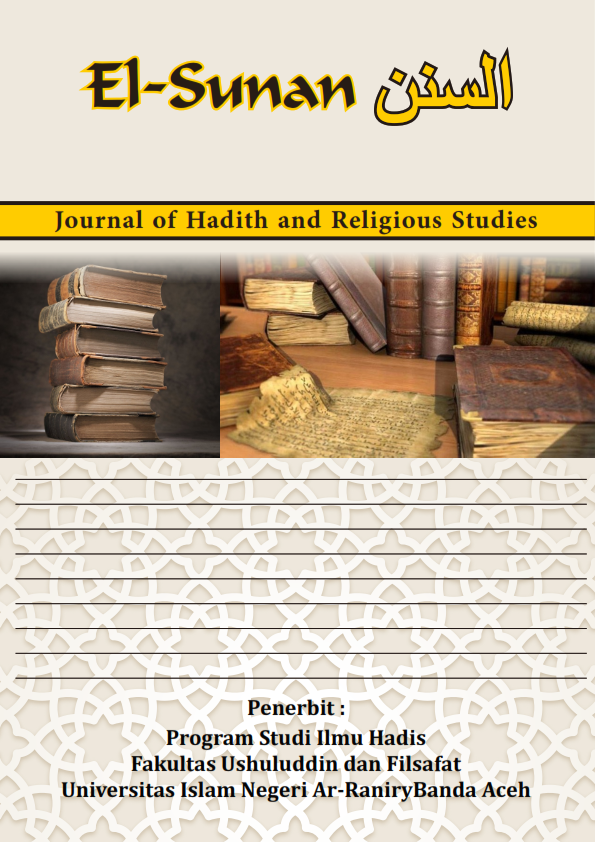The Digital Turn in Ḥadīth Studies: Ethical Foundations and Strategic Directions
DOI:
https://doi.org/10.22373/el-sunan.v3i1.6274Keywords:
Ḥadīth Studies, Digital Turn, Akhlāq, Islamic Ethics, Digital LiteracyAbstract
This article examines the ethical foundations and strategic directions that characterize the ongoing digital turn in ḥadīth studies. As the second principal source of Islamic teachings, ḥadīth is undergoing a profound transformation in how it is accessed, transmitted, and interpreted through digital technologies—particularly mobile applications, online repositories, and social media. While these developments have expanded access and public engagement, they have also raised pressing concerns about authenticity, epistemological disruption, and the marginalization of traditional scholarly authority. Using a narrative literature review approach, the study draws on academic works and digital platforms published between 2014 and 2024 to analyze how Islamic scholars and institutions are responding to these shifts. The findings reveal that digital tools—such as Lidwa Pusaka, Maktabah Syamilah, Jawāmiʿ al-Kalim, and the Digital Islamic Library—have broadened access to canonical texts and enhanced educational outreach. However, the viral circulation of unverified narrations, the influence of algorithm-driven visibility, and the rise of unqualified digital preachers have contributed to the fragmentation and trivialization of prophetic traditions. This article argues that sustaining the integrity of ḥadīth studies in the digital age requires a balanced integration of Islamic ethical principles (akhlāq), critical digital literacy, and strategic scholarly engagement. By grounding innovation in ethical responsibility and reasserting scholarly authority, digital platforms can become effective instruments for preserving the authenticity, relevance, and transformative potential of ḥadīth in contemporary Muslim life.
References
Afifah, Nur, and Iskandar Zulkarnaen, ‘Filsafat Etika Perspektif Abu Hamid Al Ghazali’, El-Waroqoh Jurnal Ushuluddin Dan Filsafat, 8.1 (2024), pp. 42–56, doi:10.28944/el-waroqoh.v8i1.1620
Anwar, Shabri Shaleh, and Ade Jamaruddin, Takhrij Hadis Jalan Manual Dan Digital (PT. Indragiri, 2018)
Fikri, Shofil, Fiimaratus Sholihah, Jasminta Murawah Hayyu, Alqodhi Adlantama, and Muhammad Hanan Ali, ‘Memahami Makna Dari Hadis Dan Ilmu Hadis Menurut Pandangan Muhadditsin Dan Ushuliyyin’, Jurnal Pendidikan Islam, 1.4 (2024), pp. 1–12, doi:https://doi.org/10.47134/pjpi.v1i4.637
Fikriyyah, Dliya Ul, ‘Telaah Aplikasi Hadis (Lidwa Pusaka)’, Jurnal Studi Ilmu Ilmu Al-Quran Dan Hadis, 17.2 (2016)
Hakak, Saqib, Amirrudin Kamsin, and Wazir Zada Khan, ‘Digital Hadith Authentication: Recent Advances, Open Challenges, and Future Directions’, Transactions on Emerging Telecommunications Technologies, 33.6 (2022), doi:10.1002/ett.3977
Huda, Karima Nurul, Akhmad Hasan Saleh, Kholila Mukaromah, and Ibnu Hajar Ansori, ‘Perkembangan Kajian Hadis Dalam Ranah Digital’, in Sisfotenika (Gunung Djati Conference Series, Conference on Islamic Civilization (CIC), 2023), pp. 69–75
Hudiarini, Sri, ‘Penyertaan Etika Bagi Masyarakat Akademik Di Kalangan Dunia Pendidikan Tinggi’, Jurnal Moral Kemasyarakatan, 2.1 (2017), pp. 1–13
Mh, Syahidil Mubarik, and Ekatul Hilwatis Sakinah, ‘Aplikasi Hadisku Sebagai Media Penyebaran Hadis Era Revolusi 5.0’, Al-Mutabar Jurnal Ilmu Hadist, III.2 (2023), pp. 48–67
Muzakky, Althaf Husein, and Muhammad Mundzir, ‘Ragam Metode Takhrij Hadis: Dari Era Tradisional Hingga Digital’, Jurnal Studi Hadis Nusantara, 4.1 (2022), pp. 74–87
Nahied, Muhammad Afda, ‘Mediatisasi Hadis: Transformasi Interpretasi Dalam Era Digital’, AL-MANAR: Jurnal Kajian Al-Quran Dan Hadits, 10.5 (2024), pp. 87–105
Nasrullah, Ar Rasyid Fajar, ‘Peran Ahmad Lutfi Fathullah Dalam Perkembangan Kajian Digitalisasi Hadis Di Indonesia’, DUCARE: Journal of Education and Learning, 1.1 (2024), pp. 31–38
Nurcahyanti, Febriani Wahyusari, ‘Pengaruh Strategi Pemasaran Untuk Meningkatkan Penjualan Produk Umkm Studi Terhadap Toko Imamgift.Art’, Jurnal Ekonomi Dan Bisnis, 11.2 (2022), pp. 302 – 315
Prihatini, Dwi, ‘Faktor-Faktor Yang Mempengaruhi Etika Sistem Informasi: Moral, Isu Sosial Dan Etika Masyarakat (Literature Review SIM)’, Jurnal Ilmiah Sistem Informasi Dan Teknik Informatika, 3.2 (2022), pp. 520–29, doi:https://doi.org/10.38035/jmpis.v3i2
Pujanarko, Mung, ‘Etika Komunikasi Verbal Dalam Penulisan Berita Di Media Online’, Jurnal Citra, 6.1 (2018), pp. 1–12
Rahman, Andi, ‘Pengenalan Atas Takhrij Hadis’, Riwayah : Jurnal Studi Hadis, 2.1 (2017), p. 146, doi:10.21043/riwayah.v2i1.1617
Ramadhan, Abdul Rahman, and Siti Aisyah Nur Sari, ‘Urgensi Program Studi Ilmu Hadis Pada Perguruan Tinggi Islam Terhadap Penyebaran Hadis Palsu Pada Era Digital Dalam Tinjauan Maqashid Syariah’, AL-ATSAR : Jurnal Ilmu Hadits, 1.1 (2023), pp. 1–25
Rosyad, Sabilar, and Muhammad Alif, ‘Hadis Di Era Digital: Tantangan Dan Peluang Penggunaan Teknologi Dalam Studi Hadis’, Jurnal Ilmu Agama, 23.2 (2022), pp. 129–41, doi:https://doi.org/10.19109/jia.v23i2.15064
Rustianto, Muhammad Ari, Guntur Pribadi, and Lilik Andaryuni, ‘Metode Dan Paradigma Pemahaman Hadis Di Indonesia.’, Attractive: Innovative Education Journal, 6.1 (2024), p. 303
Saputra, Hasep, ‘Genealogi Perkembangan Studi Hadis DI Indonesia’, Al Quds : Jurnal Studi Alquran Dan Hadis, 1.1 (2016), pp. 41–68, doi:https://doi.org/10.29240/alquds.v1i1.164
Ummah, Siti Syamsiyatul, ‘Digitalisasi Hadis (Studi Hadis Di Era Digital)’, Diroyah: Jurnal Ilmu Hadis, 4.1 (2019), pp. 1–10
Wahid, Abd., and Junida, ‘Urgensitas Pembelajaran Ilmu Hadis Di Era Digital’, El-Sunan Journal Of Hadith And Religious Studies, 1.1 (2023), pp. 12–20, doi:10.22373/el-sunan.v1i1.3454
Wahid, Ramli Abdul, and Dedi Masri, ‘Perkembangan Terkini Studi Hadis Di Indonesia’, MIQOT, XLII.2 (2018), pp. 263–80
Wahyuningsih, Sri, and Istianah, Kontribusi Digitalisasi Hadis Bagi Perkembangan Studi Hadis Di Era Revolusi Industri 4.0, ed. by CV. Global Aksara Pres (2021)
Downloads
Published
How to Cite
Issue
Section
License
Copyright (c) 2024 M. Alhafidh Akbar, Abd Wahid, Taslim HM Yasin

This work is licensed under a Creative Commons Attribution-NonCommercial-ShareAlike 4.0 International License.
- Authors retain copyright and grant the journal right of first publication with the work simultaneously licensed under an Attribution-NonCommercial-ShareAlike 4.0 International (CC BY-NC-SA 4.0) that allows others to share the work with an acknowledgment of the work's authorship and initial publication in this journal.
- Authors are able to enter into separate, additional contractual arrangements for the non-exclusive distribution of the journal's published version of the work (e.g., post it to an institutional repository or publish it in a book), with an acknowledgment of its initial publication in this journal.
- Authors are permitted and encouraged to post their work online (e.g., in institutional repositories or on their website) prior to and during the submission process, as it can lead to productive exchanges, as well as earlier and greater citation of published work.










